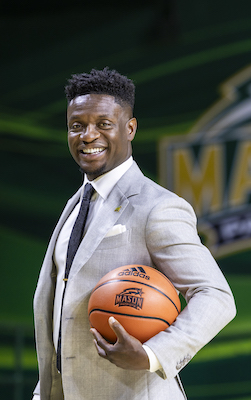How does it feel to be back on the campus where it all began for you and where you became a key part of school lore with that improbable 2006 Final Four run?
It’s still surreal. I don’t think a moment is going to come when I settle down from my thoughts and my initial happiness from just being here. It’s definitely become a little bit easier just with managing a team and putting a team together. When I got the job, I had nine scholarships [to fill]. I only had four returners, so there was a lot—a lot of work to do. So as excited as I was, right after that press conference [in April], there was a lot of anxiety. It’s a little nerve-racking just trying to get your staff together, then find your players, and [I was] trying to do a little bit of both. Now it’s about getting after it and getting acclimated to our guys.

What are the biggest obstacles in cherishing the past while looking to move forward, and how do you overcome them?
I told myself when I left Mason that—as a good of a feeling as that run was—I wanted to make sure that I was always evolving. As a pro, I had that same mindset.
Even when I finished playing and got into coaching, I didn’t allow the Final Four to define me—I always wanted to reinvent myself. So, when I hear the Final Four—as happy as I am to have been a part of it—the one thing I haven’t done through my career is use that as a crutch. And I think that’s helped put me in this position because I wouldn’t be here as a basketball coach just because of the Final Four. I put myself in the position where I learned from a lot of great coaches along the way. [The Final Four] is definitely a part of who I am, but at the same time, the sky’s the limit to where I want to take this program.
With the promise of immediate gratification so readily available in the form of the transfer portal and name, image, and likeness (NIL) deals, how do you convince student-athletes to be patient and that their time will come if they’re willing to put in the work?
I think that’s all part of the recruitment process. You have to navigate who you think fits the culture. At the end of the day, you have a roster to fill and a team to manage. Some guys’ expectations are different than others, and it’s a battle of how to keep everybody happy. It’s not easy, and it’s definitely become more difficult with [the advent of the transfer portal and NIL deals]. But I think having a really good coaching staff that understands that it’s not just about bringing in any kid, but bringing in the right kid. [That] makes a difference.
Related News
- April 25, 2024
- April 23, 2024
- March 21, 2024
- March 1, 2024
- February 28, 2024
